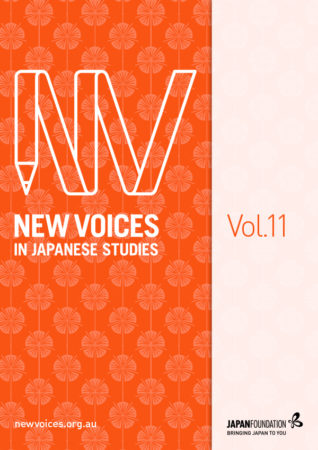By Yoshihiro Wada
Director, The Japan Foundation, Sydney
It is my great pleasure to introduce Volume 11 of New Voices in Japanese Studies. Since the journal’s renewal in 2015, each new volume has brought with it at least one new development, and this volume is no exception. From this year, we are delighted to add reviews to the journal’s publication remit. This opens up additional ways for early career scholars to engage in scholarly debate via the New Voices in Japanese Studies platform, which in turn can only further broaden the journal’s readership. We are also incredibly pleased to announce that New Voices in Japanese Studies is now indexed by leading research database EBSCO Host, and we look forward to the increased discoverability this will offer the authors who publish with us.
Compared with Volume 10, which primarily featured the work of Honours students, this volume is distinct in that all authors are either PhD candidates or recent PhD graduates. Eligibility was only opened to PhD candidates from Volume 7 and to recent PhD graduates from Volume 8, so it is pleasing to see that the journal is indeed filling a niche in these areas. In terms of content, Volume 11 brings together work from a broad spectrum of disciplines, covering an equally broad spectrum of subject matter. The authors of the four main papers represent areas of study as diverse as environmental law, creative writing, media studies and civil society. Add the authors of the reviews—representing literature, religious studies and education policy—and the pool becomes broader still.
Despite this breadth, a close look at the featured papers reveals some surprising intersections. For example, while one paper examines how the Tokyo 2020 Olympic Games has become a source of tension for evacuees of the 3.11 disaster in Tohoku, another suggests that the omotenashi rhetoric that has emerged in relation to the Olympics has resulted in increasing levels of acceptance of Muslims in Japan. A third paper engages again with the 3.11 disaster, considering how social media use helped to generate a sense of community among Japanese people at the time. The themes of community and 3.11 also feature in the remaining paper, which looks at how Japan’s environmental governance frameworks foster community involvement in wetland restoration, and argues that a ”restoration ethos” underpins laws around post-3.11 recovery as well as environmental legislation. In this way, Volume 11 reflects the current state of Japanese Studies in our local region: broad in scope, yet fundamentally connected—often in fascinating ways.
I would like to take this opportunity to extend my heartfelt thanks to the Guest Editor for this volume, Dr Emma Dalton of RMIT University. Editing these annual volumes, small as they may be, is no easy task. In balancing the time-intensive and sometimes unpredictable requirements of the journal with her day-to-day research and teaching loads, Emma has accomplished a remarkable feat, and we greatly appreciate the time, insight and expertise that she has so generously given to shape the papers in this volume. I also wish to thank this year’s Editorial Board, who similarly gave of their time and expertise to provide valuable feedback on these and other papers. Finally, I wish to thank the Series Editor, Elicia O’Reilly, for her tireless efforts to further improve the journal each year and for bringing yet another volume to fruition.
Not all papers submitted to this volume have been published here. The editorial process can be difficult and time-consuming, requiring patience, vision and perseverance from both authors and editors alike. I congratulate the authors whose work is published in this volume. Equally, I encourage the authors whose submissions still require work not to be daunted, but to revise and resubmit, and I look forward to seeing their research published in a future volume.
In closing, whether you are a reader, author, reviewer, supervisor or editor of New Voices in Japanese Studies, we thank you for your interest in this volume and look forward to your continued support.
(July 2019)

